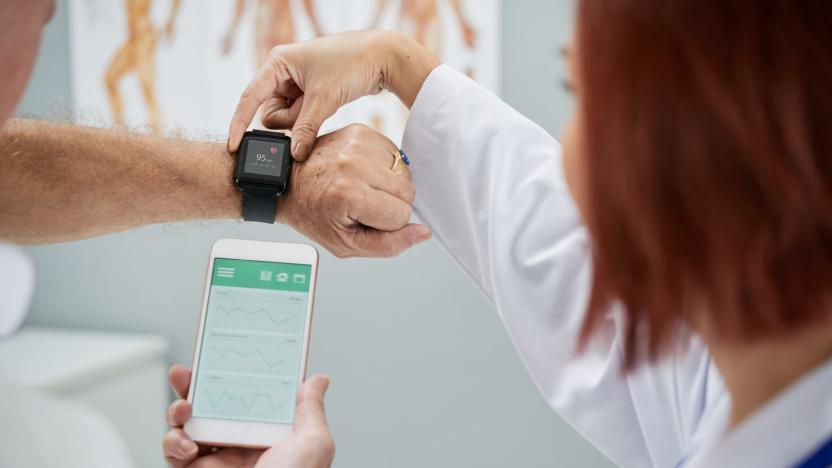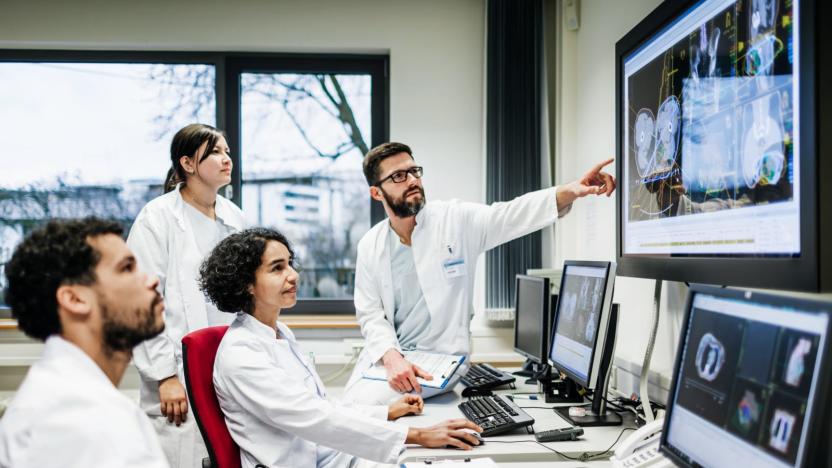medical records
Latest

Thousands of unsecured medical records were exposed online
A cloud server used by nTreatment held data on US patients, including children.

Major health records company fights federal rules on shareable patient data
A major medical records company, Epic Systems, is urging hospitals to oppose new patient data rules proposed by the Department of Health and Human Services (HSS), CNBC reports. The regulations are meant to make it easier to share medical data and for patients to access their data using smartphone apps. But critics say the rules don't do enough to protect patient privacy, and opponents like Epic CEO Judy Faulkner fear app makers will have access to patient data without consent.

Google is reportedly gathering health data on millions of Americans
Google is gathering detailed health record information from millions of Americans -- and it has not informed patients or doctors, The Wall Street Journal reports. According to WSJ, St. Louis-based Ascension, the second-largest health system in the US, is sharing lab results, diagnoses and hospitalization records, as well as health histories complete with patient names and dates of birth, with Google.

Google wants to give doctors web-like searches for medical records
Google made much ado of its recently created Health unit, but it didn't offer much insight into what that division would actually... well, do. Now, however, it's considerably clearer. Google Health lead David Feinberg and CNBC sources have outlined some of the ideas his team has, and they revolve around (surprise!) search for both you and your doctor. Feinberg envisions a search bar that would help doctors search medical records like they do the web. A doctor could search for "87" to find an 87-year-old patient instead of using the patient's name, as an example.

Millions of Americans' medical records are out in the open on the internet
If you've ever visited a private medical clinic, your records could be at risk. A new joint investigation published by ProPublica and German broadcaster Bayerischer Rundfunk found that the medical data of some 5 million patients in the US is easily obtainable with free software or just a simple web browser.

32 million patient records were breached in the first half of 2019
More than 32 million patient records were breached between January and June 2019. That's more than double the 15 million medical records breached in all of 2018, says healthcare analytics firm Protenus. According to the company, the number of disclosed incidents rose to 285 in the first half of the year, and the longstanding trend of at least one health data breach per day shows no signs of slowing down.

A public database exposed medical records of 150,000 rehab patients
Nearly 150,000 patients who sought treatment at an addiction recovery facility in Pennsylvania had their medical records exposed online. Through the public search engine Shodan, independent researcher Justin Paine found an ElasticSearch database with nearly five million rows of data. It appeared to include personally identifiable information (PII) of patients who were treated at Steps to Recovery between mid 2016 and late 2018.

Indian health agency exposes details on millions of pregnant women
A health department in India exposed more than 12.5 million medical records for pregnant women after it failed to secure a database. The records span five years for a state in the north of the country, and include sensitive data such as family medical history, the mother's age, details of other children, doctor information and court case details.

Tiny RFID amulet stores medical records, makes paramedics' lives easier
Using RFID to store medical records, ultimately making the jobs of paramedics and doctors that much easier, is hardly a new concept. But, for the most part, such devices have been limited to clinical trials. Asahi Kasei Corp. is hoping to change that with the debut of a tiny, 3cm-square charm that can be read by a computer or smartphone. In addition to basic info, such as name, birth date, and blood type, the chip could transmit links to more storage-intensive data like X-rays images. Instead of building out a proprietary system, the company is relying on established technology called FeliCa from Sony. That means the device will enjoy broad compatibility with existing products, and should be inexpensive to produce. Asahi Kasei hopes to begin selling the medical amulets to cities and hospitals within a year, for as little as ¥2,000 (around $25).

London's E-Health Cloud program will send patient records to the stratosphere next month
You'd think that the recent spate of high-profile cyberattacks would've deterred the healthcare industry from sending patient records to the cloud -- but you'd be wrong. Beginning next month, all data on patients at London's Chelsea and Westminster Hospital will be stored in a centralized database, accessible from any computer, smartphone or tablet. Under the National Health Service's pilot program, known as E-Health Cloud, patients will be able to decide which doctors, nurses or family members can view their records, allowing them to easily share their data with other specialists. Flexiant, the Scottish software company that developed the platform, hopes to eventually expand it to other treatment phases, including assisted living, and insists that its system will help the NHS save money in the long-term. Security, however, will likely prove critical to the program's success. Users will have to pass multiple ID checkpoints to access the database, but privacy-wary Londoners might demand protection a bit more robust than an automated bouncer. You won't need to adhere to a dress code to view the full PR, available after the break.

NYU medical center goes sci-fi, scans patients' palms
NYU's Langone Medical Center is getting a jump on that whole 21st-century medical care thing by ditching the clipboards and paperwork for palm scans and digital databases. On June 5th the hospital threw the switch on an electronic patient-tracking program from Epic Systems and paired it with biometric identification technology from PatientSecure, which scans the veins in persons hands using near-infrared light. Instead of being forced to fill out forms with your insurance info and social security number every time you visit, you simply place your hand on a scanner and -- ta-da! -- your records come right up. By combining the vasculature scans (which are even more unique than fingerprints) with patient photos, NYU should be able to minimize misidentification and cut down on duplicate records. Rather than go out on some cheesy pun about palm reading, we'll leave the predictable word play to the folks at ABC news -- check out their coverage after the break alongside PR from the Langone Medical Center.

IBM's Jeopardy-winning supercomputer headed to hospitals. Dr. Watson, we presume?
We always knew that Watson's powers extended well beyond the realm of TV trivia, and now IBM has provided a little more insight into how its supercomputer could help doctors treat and diagnose their patients. Over the past few months, researchers have been stockpiling Watson's database with information from journals and encyclopedias, in an attempt to beef up the device's medical acumen. The idea is to eventually sync this database with a hospital's electronic health records, allowing doctors to remotely consult Watson via cloud computing and speech-recognition technology. The system still has its kinks to work out, but during a recent demonstration for the AP, IBM's brainchild accurately diagnosed a fictional patient with Lyme disease using only a list of symptoms. It may be another two years, however, before we see Watson in a white coat, as IBM has yet to set a price for its digitized doc. But if it's as sharp in the lab as it was on TV, we may end up remembering Watson for a lot more than pwning Ken Jennings. Head past the break for a video from the University of Maryland School of Medicine, which, along with Columbia University, has been directly involved in IBM's program.

iPads headed into operating rooms along with surgeons
While some hospitals are eying the iPad as a way of going paperless with patient records, Georgetown University is already putting them directly in the operating room and into the hands of its surgeons. Offering real-time access to records and images of patients while inside the operating room, iPads have become "as essential as a scalpel" for surgeons while eliminating guesswork for those taking care of multiple patients each day. "The iPad clearly has the potential to be very useful in the hospital and in the operating theater," says Dr. Felasfa Wodajo in the January 2011 issue of the Journal of Surgical Radiology. "The same features which make the iPad great for surfing the web, such as looking at images and viewing video, nicely translate into the operating room." We have written about iPads showing up in Chicago-area hospitals and being offered to hospitals as a campaign promise in Australia, so I think we can safely assume that this trend will only increase as they become more popular outside of medical facilities. I have read a lot about how their use should bring down medical costs for patients. More and more hospitals are realizing just how powerful a tool like the iPad can be. [via American Consumer News]





